The Code of Conduct and the Vietnam War is a report from an individual research project conducted by John McCain, Commander, United States Navy, at the National War College. It has a 44 pages and was released on April 8, 1974.
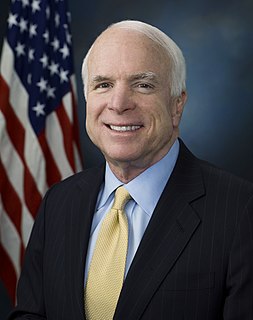
John Sidney McCain III was an American politician and military officer, who served as a United States senator from Arizona from January 1987 until his death. He previously served two terms in the United States House of Representatives and was the Republican nominee for president of the United States in the 2008 election, which he lost to Barack Obama.

The National War College (NWC) of the United States is a school in the National Defense University. It is housed in Roosevelt Hall on Fort Lesley J. McNair, Washington, D.C., the third-oldest Army post still active.
The purpose of this paper was to review the Code of Conduct in the perspective of the Vietnam prisoner of war experience and to make recommendations for changes to the code itself and to the training and indoctrination of the members of the Armed Forces in the Code of Conduct. Additionally, recommendations are presented for the education of the members of the Armed Forces and the U.S. public in order to minimize the use of POWS in the future as political hostages and propaganda vehicles.
The Vietnam War was the first test of the Code of Conduct. The majority of the American POWS were held captive longer than in any other war engaged in by Americans. The paper discusses the Code of Conduct, article by article, and assesses its value and viability as they related to the Vietnam War experience. The report compares conditions and treatment American POWs experienced in Vietnam, and how it affected their ability to live up to the code.
In the report Commander McCain writes that, "The American people have been inoculated with too many John Wayne movies and other examples of unbreakable will and super human strength. It has been amply proved that every man has a breaking point."

Hỏa Lò Prison was a prison used by the French colonists in French Indochina for political prisoners, and later by North Vietnam for U.S. prisoners of war during the Vietnam War. During this later period it was known to American POWs as the Hanoi Hilton. The prison was demolished during the 1990s, although the gatehouse remains as a museum.

James Bond Stockdale was a United States Navy vice admiral and aviator awarded the Medal of Honor in the Vietnam War, during which he was a prisoner of war for over seven years.

The Prisoner of War Medal is a military award of the United States Armed Forces which was authorized by Congress and signed into law by President Ronald Reagan on 8 November 1985. The United States Code citation for the POW Medal statute is 10 U.S.C. § 1128.
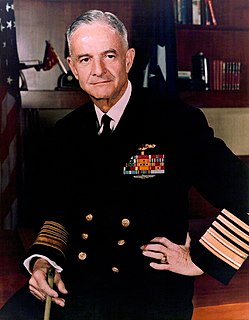
John Sidney "Jack" McCain Jr. was a United States Navy admiral who served in conflicts from the 1940s through the 1970s, including as the Commander, United States Pacific Command.

Jeremiah Andrew Denton Jr. was a U.S. Senator representing Alabama from 1981 to 1987, a United States Navy Rear Admiral, and Naval Aviator taken captive during the Vietnam War.
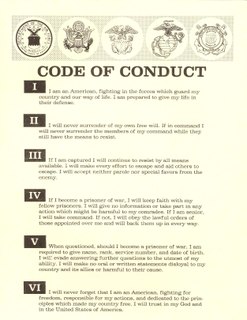
The Code of the U.S. Fighting Force is a code of conduct that is an ethics guide and a United States Department of Defense directive consisting of six articles to members of the United States Armed Forces, addressing how they should act in combat when they must evade capture, resist while a prisoner or escape from the enemy. It is considered an important part of U.S. military doctrine and tradition, but is not formal military law in the manner of the Uniform Code of Military Justice or public international law, such as the Geneva Conventions.

William Porter "Bill" Lawrence, was a decorated United States Navy vice admiral and Naval Aviator who served as Superintendent of the U.S. Naval Academy from 1978 to 1981.

George Thomas Coker is a retired United States Navy commander who was awarded the Navy Cross for extraordinary heroism as a prisoner of war (POW) during the Vietnam War. An Eagle Scout, he is noted for his devotion to scouting.

Everett Alvarez Jr. is a former United States Navy officer who endured one of the longest periods as a prisoner of war (POW) in U.S. military history. Alvarez was the first U.S. pilot to be downed and detained during the Vietnam War and spent over eight years in captivity, making him the second longest-held U.S. POW, after U.S. Army Colonel Floyd James Thompson.
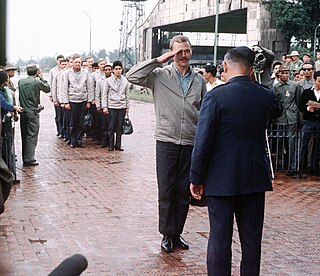
Operation Homecoming was the return of 591 American prisoners of war (POWs) held by North Vietnam following the Paris Peace Accords that ended U.S. involvement in the Vietnam War.
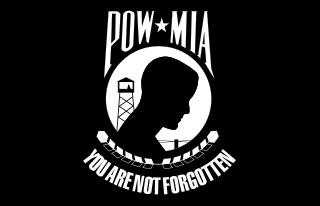
The National League of Families of American Prisoners and Missing in Southeast Asia is an American 501(c)(3) non-profit organization that is concerned with the Vietnam War POW/MIA issue. According to the group's web site, its sole purpose is "to obtain the release of all prisoners, the fullest possible accounting for the missing and repatriation of all recoverable remains of those who died serving our nation during the Vietnam War in Southeast Asia." The League's most prominent symbol is its famous POW/MIA flag.
The Senate Select Committee on POW/MIA Affairs was a special committee convened by the United States Senate during the George H. W. Bush administration to investigate the Vietnam War POW/MIA issue, that is, the fate of United States service personnel listed as missing in action during the Vietnam War. The committee was in existence from August 2, 1991 to January 2, 1993.

Faith of My Fathers is a 1999 bestselling non-fiction book by United States Senator John McCain with Mark Salter. Published by Random House, it is part autobiography, part family memoir. It traces the story of McCain's life growing up, during his time in the United States Naval Academy, and his military service as a naval aviator before and during the Vietnam War. His story is interwoven with those of his father John S. "Jack" McCain, Jr. and his grandfather John S. "Slew" McCain, Sr., both four-star admirals in the Navy.
The early life and military career of John Sidney McCain III spans the first forty-five years of his life (1936–1981). McCain's father and grandfather were admirals in the United States Navy. McCain was born on August 29, 1936, in the Panama Canal Zone, and attended many schools growing up as his family moved among naval facilities. McCain graduated from the United States Naval Academy in 1958. He married the former Carol Shepp in 1965; he adopted two children from her previous marriage and they had another child together.
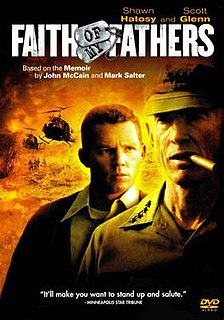
Faith of My Fathers is a 2005 American television film, directed by Peter Markle. Based on the 1999 memoir of the same name by United States Senator and former United States Navy aviator John McCain, it aired on A&E Network on Memorial Day, May 30, 2005.
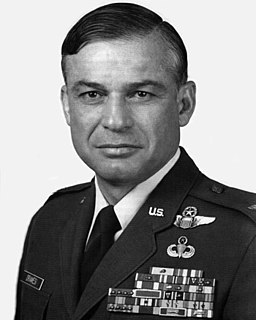
John Arthur Dramesi was a retired United States Air Force (USAF) Colonel who was held as a prisoner of war from April 1967 to February 1973 in Hoa Lo Prison, known as the "Hanoi Hilton," and "the Zoo," during the Vietnam War.
The Vietnam War POW/MIA issue concerns the fate of United States servicemen who were reported as missing in action (MIA) during the Vietnam War and associated theaters of operation in Southeast Asia. The term also refers to issues related to the treatment of affected family members by the governments involved in these conflicts. Following the Paris Peace Accords of 1973, 591 U.S. prisoners of war (POWs) were returned during Operation Homecoming. The U.S. listed about 2,500 Americans as prisoners of war or missing in action but only 1,200 Americans were reported to have been killed in action with no body recovered. Many of these were airmen who were shot down over North Vietnam or Laos. Investigations of these incidents have involved determining whether the men involved survived being shot down. If they did not survive, then the U.S. government considered efforts to recover their remains. POW/MIA activists played a role in pushing the U.S. government to improve its efforts in resolving the fates of these missing service members. Progress in doing so was slow until the mid-1980s, when relations between the U.S. and Vietnam began to improve and more cooperative efforts were undertaken. Normalization of U.S. relations with Vietnam in the mid-1990s was a culmination of this process.

Lawrence Nicholas "Larry" Guarino was a U.S. Air Force officer, and veteran of three wars. Shot down on his 50th combat mission, he spent more than 8 years as a prisoner of war (POW) during the Vietnam War and earned the Air Force Cross.
Members of the United States armed forces were held as prisoners of war (POWs) in significant numbers during the Vietnam War from 1964 to 1973. Unlike U.S. service members captured in World War II and the Korean War, who were mostly enlisted troops, the overwhelming majority of Vietnam-era POWs were officers, most of them Navy, Air Force, and Marine Corps airmen; a relatively small number of Army enlisted personnel were also captured, as well as one enlisted Navy seaman who fell overboard from a naval vessel. Most U.S. prisoners were captured and held in North Vietnam by the North Vietnamese Army; a much smaller number were captured in the south and held by the National Liberation Front. A handful of U.S. civilians were also held captive during the war.
















